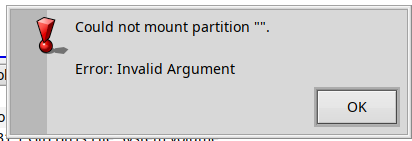Good day,
So today I’m testing things again. When I plug in a Full EXT4 pendrive (single partition and try to mount it through Drive Setup, it reports this when trying to mount the partition:

But the disk is not available in the Mount menu (Right click).
When I plug it in, Syslog records this:
Blockquote
KERN: usb hub 2: port 2: new device connected
KERN: usb_disk: device reports a lun count of 1
KERN: usb_disk: vendor_identification “SanDisk”
KERN: usb_disk: product_identification “Ultra”
KERN: usb_disk: product_revision_level “1.00”
KERN: publish device: node 0xffffffffe2732148, path disk/usb/0/0/raw, module drivers/disk/usb_disk/device_v1
KERN: DMAResource@0xffffffffe1d69960: low/high 0/ffffffffffffffff, max segment count 16, align 1, boundary 0, max transfer 65536, max segment size 18446744073709551615
KERN: usb_disk: got device name “SanDisk Ultra 1.00”: No error
KERN: intel: Found GPT signature, ignoring.
KERN: EFI header: EFI PART
KERN: EFI revision: 10000
KERN: header size: 92
KERN: header CRC: 961cc0f6
KERN: absolute block: 1
KERN: alternate block: 120176639
KERN: first usable block: 34
KERN: last usable block: 120176606
KERN: disk GUID: c9c148b2-72ab-4109-8aca-ca31170ee909
KERN: entries block: 2
KERN: entry size: 128
KERN: entry count: 128
KERN: entries CRC: d7c489e4
KERN: EFI header: EFI PART
KERN: EFI revision: 10000
KERN: header size: 92
KERN: header CRC: 3cd6e823
KERN: absolute block: 120176639
KERN: alternate block: 1
KERN: first usable block: 34
KERN: last usable block: 120176606
KERN: disk GUID: c9c148b2-72ab-4109-8aca-ca31170ee909
KERN: entries block: 120176607
KERN: entry size: 128
KERN: entry count: 128
KERN: entries CRC: d7c489e4
KERN: [ 0] partition type: 0fc63daf-8483-4772-8e79-3d69d8477de4
KERN: unique id: 0ef58457-41f8-4637-88ab-a49b25c3ef8c
KERN: start block: 2048
KERN: end block: 120174591
KERN: size: 58677.999 MB
KERN: attributes: 0
KERN: name: Vesta64Ext4
KERN: identify(66, 0xffffffffe276e210)
KERN: usb_disk: unhandled ioctl 10102
KERN: efi_gpt_scan_partition(cookie = 0xfffffffff282b8c8)
KERN: identify(66, 0xffffffffe276e2d0)
KERN: e[34mext2:e[0m ext2: incompatible features not supported: 2000 (extents 40)
KERN: usb_disk: unhandled ioctl 10102
Now, If I try with the drive with the 3 partitions: Ext4, BFS y Exfat, the EXT4 partition behaves like the single pendrive. It’s not there in the menu, it shows in Drive Setup as Unknown (Linux data).
In this case, it’s also not mountable spitting the same error as shown above (the picture)
Syslog now adds the following:
Blockquote
KERN: usb_disk: got device name “Sandisk Ultra 1.00”: No error
KERN: intel: Found GPT signature, ignoring.
KERN: EFI header: EFI PART
KERN: EFI revision: 10000
KERN: header size: 92
KERN: header CRC: c95b58d4
KERN: absolute block: 1
KERN: alternate block: 3907029167
KERN: first usable block: 2048
KERN: last usable block: 3907029134
KERN: disk GUID: 4623c61d-4506-4880-9952-729611c7bcfb
KERN: entries block: 2
KERN: entry size: 128
KERN: entry count: 128
KERN: entries CRC: 7e907e8e
KERN: EFI header: EFI PART
KERN: EFI revision: 10000
KERN: header size: 92
KERN: header CRC: 23e82777
KERN: absolute block: 3907029167
KERN: alternate block: 1
KERN: first usable block: 2048
KERN: last usable block: 3907029134
KERN: disk GUID: 4623c61d-4506-4880-9952-729611c7bcfb
KERN: entries block: 3907029135
KERN: entry size: 128
KERN: entry count: 128
KERN: entries CRC: 7e907e8e
KERN: [ 0] partition type: 0fc63daf-8483-4772-8e79-3d69d8477de4
KERN: unique id: a3d63bde-7b4f-4760-a742-de09cb74dea3
KERN: start block: 2048
KERN: end block: 1579157503
KERN: size: 771071.999 MB
KERN: attributes: 0
KERN: name:
KERN: [ 1] partition type: 0fc63daf-8483-4772-8e79-3d69d8477de4
KERN: unique id: 7e286ebc-59c6-4436-bf95-29b1031f9215
KERN: start block: 1579157504
KERN: end block: 3158312959
KERN: size: 771071.999 MB
KERN: attributes: 0
KERN: name: HyakutakeBfs
KERN: [ 2] partition type: ebd0a0a2-b9e5-4433-87c0-68b6b72699c7
KERN: unique id: 1c7c9c91-b542-4e8f-9d80-34e925fb9169
KERN: start block: 3158312960
KERN: end block: 3907028991
KERN: size: 365583.999 MB
KERN: attributes: 0
KERN: name:
KERN: identify(67, 0xfffffffff303dc50)
KERN: usb_disk: unhandled ioctl 10102
KERN: efi_gpt_scan_partition(cookie = 0xfffffffff282fe00)
KERN: identify(67, 0xfffffffff3040bc0)
KERN: e[34mext2:e[0m ext2: incompatible features not supported: 2000 (extents 40)
KERN: usb_disk: unhandled ioctl 10102
KERN: identify(67, 0xfffffffff3040bc0)
KERN: usb_disk: unhandled ioctl 10102
KERN: identify(67, 0xfffffffff3040bc0)
KERN: usb_disk: unhandled ioctl 10102
So yep, looks like in both situations I have “incompatible features not supported”.
Strange thing (from my POV) is that if the pendrive only holds the EXT4 partition, Syslog catches the partition Name. In the case of the multipartition, Syslog does not catch the names but the BFS partition one. This is odd.
Guess that I have to wait to have a filesystem format that can be used across systems…
Thanks again for your help.
Regards,
RR
